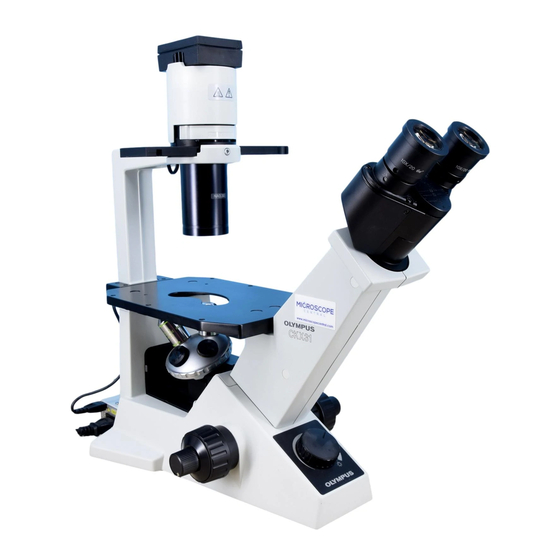Olympus CKX31 Brochure & Specs - Page 3
Parcourez en ligne ou téléchargez le pdf Brochure & Specs pour {nom_de_la_catégorie} Olympus CKX31. Olympus CKX31 4 pages. Culture microscopes
Également pour Olympus CKX31 : Vue d'ensemble (7 pages), Manuel de réparation (43 pages)

3
Just set the specimen on the stage and observe
immediately while standing, with no optical adjustments.
Pre-centered phase contrast slider for quick,
adjustment-free observation
With the pre-centered phase contrast slider, there is no need to
repeat centering each time the objective magnification is changed.
Likewise, ring slit exchange when swapping between objectives is
also unnecessary, since the ring slit is standardized for 10X, 20X
and 40X magnifications. The CKX series makes phase contrast
observations quick and easy, without optical adjustments, for much
more efficient performance of routine tasks. Since the phase plate
transmission rates are dictated by the objective in use, the
brightness remains constant
even when the magnification
is changed.
*The IX2-SL with centering mechanism
enables maximized phase contrast
performance with precise optical
adjustments.
10X
20X
40X
4X
10X, 20X, 40X
Empty slot
Slim, compact design takes up minimum laboratory space
The slim, compact design minimizes the depth of the microscope,
allowing easy installation right beside the incubator or clean bench.
Specimens can be taken and immediately set on the microscope
stage for quick, efficient inspection.
Tilting binocular tube for observation while standing
The binocular tube has a 30-60 degree tilting mechanism to let the
researcher make observations while standing. The specimen is
removed from the incubator and placed straight onto the
microscope stage, so that cell checking can be done immediately.
"Quick observation, quick return"— that's the new style of routine
inspection made possible by Olympus.
Easy observation at the clean bench
The tilting binocular tube combination makes it unnecessary for
researchers to adopt uncomfortable postures like lowering their face
to the inside of the clean bench. Simply observe down the tube
while working, and raise the tube afterwards: this method is much
more convenient, since the clean bench can be opened/closed
without moving the microscope.
4
